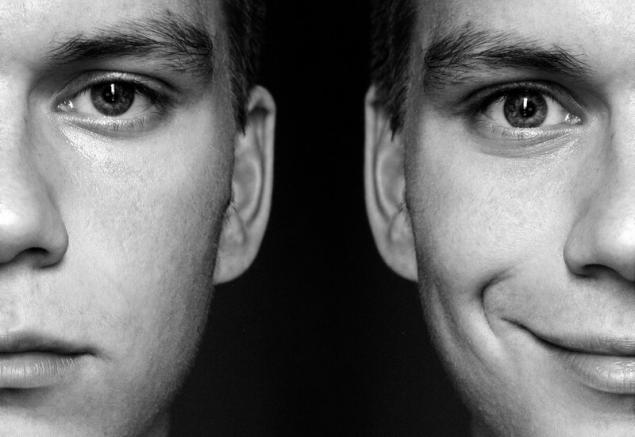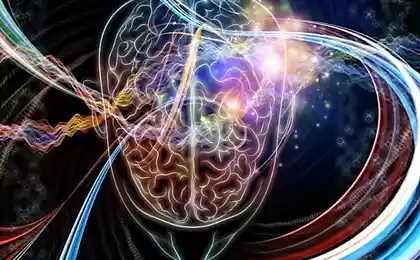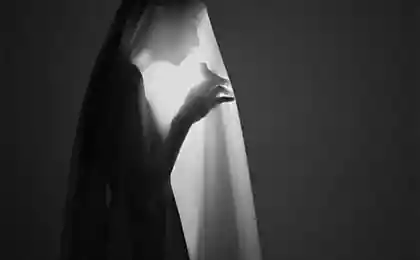842
Why we come to mind horrible thoughts
Good that there is still no device to read thoughts, otherwise any of us would be caught red-handed. Because even the most gentle and sensitive man may sometimes enjoy the failure of a neighbor or be tempted to smash someone's head in. Why do the good citizens enjoy watching thrillers with dismemberment, and ardent liberals sometimes you catch yourself on xenophobia? And can you prevent such "thoughtcrime"? This was written by Jenna, Pincott on the website Psychology Today.

Each of us sometimes catches himself wrong, scary or nasty thoughts. Bend over a cute baby and suddenly think: "I could easily smash his skull in". To comfort a friend who survived the crash in his personal life, and secretly relish the humiliating details of his story. To go with family in the car and in detail to imagine how you lose control and go into the oncoming lane.
The harder we try to escape from these ideas, the more obsessive they become and the worse we feel. It's not easy to admit, but we really get pleasure from primitive thrills, and someone else's misfortune. People are amazingly bad own black thoughts: we do not control neither the duration nor the content.
In the 1980s, in his famous experiment Eric Klinger asked for volunteers during the week to record your thoughts every time the alarm sounds a special device. Scientist found that over a 16-hour day the man is visited by approximately 500 unintentional and obsessions, lasting an average of 14 seconds. Although most of the time our attention is occupied with the daily Affairs, 18% of the total number of thoughts gives a person the discomfort and marked as bad, evil and politically incorrect. And 13% can be described as totally unacceptable, dangerous, or shocking, for example, thoughts of killing and perversion.
Swiss psychoanalyst Carl Jung, one of the first seriously became interested in black thoughts. In his work "psychology of the unconscious" (1912) he described the shadow side of the personality, the seat of sinful desires and animal instincts that we usually repress.
How is the dark side of personality? From the point of view of neuroscience part of cognitive processes generates the "I" with which we habitually identify themselves, is a sensible, normal, logical one, while other processes contribute to the development of dark, irrational consciousness, where haunting images and ideas.
According to the theory of Klinger, the ancient preconscious mechanism in our brain is constantly looking for in the outside world are potential sources of danger. Information about them, bypassing the consciousness is transferred in the form of emotional signals and cause unwanted thoughts. Neuroscientist Sam Harris believes that these thoughts are random and completely unguided: although man has consciousness, he can't fully control his psychic life.
Dark and scary thoughts
"That's disgusting, show me more"
People hate to admit that they are attracted by a sinister and ugly history: it is believed that this is the lot of freaks and perverts. Fans of bloody thrillers, photobook with victims of accidents or pickled embryos have a reduced capacity for empathy. Thirty years ago, a University of Delaware Professor Marvin Zuckerman has determined that some people are more exposed to the need for excitement. When confronted with something abnormal and horrible people with this personality type is more excited — this can be determined by measuring elektrotermicheskogo activity.
Craving for unhealthy and terrible things can be useful. According to psychologist Eric Wilson, thoughts on the sufferings of others enable us to neutralize the destructive emotions without causing harm to himself and others. They can even lead to a state of awe: "I can now realize the value of my own life, — says Wilson — because myself and my family alive and healthy!"
Thoughts of sexual perversion
"Do not open at work... and anywhere else"
Many of us consider to be the most disgusting thoughts related to sexual taboos: nothing is worse than to catch yourself fantasizing about something immoral or illegal.
Good news: easy initiation means nothing. Clinical psychologist Lee Baer, Professor of medical school of Harvard University, argues that arousal is a natural reaction to the attention: "Try to think about your genitals and to convince myself I don't feel anything". If you have an idea about rape or underage sex, it does not mean that you are going to bring this idea to life. All men think about sex, but not all fantasies are to be taken literally.
The female erotic fantasies about submission and rape is a logical explanation. Researchers at the University of North Texas found that 57% of women have ever felt the excitement, fantasizing about violent sex act with him in the role of victim. This can be explained by the desire of women to be desired — so much so that a man can't control himself. Another explanation is that rush of endorphins that are actively receiving blood because of a rapid heartbeat that accompanies the feeling of fear and disgust. Imaginary situation of coercion allows to give freedom secret "perverse" desires without feeling guilt. Rape fantasies that remain safely under control of our consciousness, nothing to do with the desire to be raped in real life.
Politically incorrect thoughts
"If they find out what I think, they'll hate me"
Hated the voice in your head that turns on when in your field of attention you receive "other" — be it a person in a wheelchair, veiled women, brightly clad tranny or a foreigner with unusual skin color. This voice that you struggled choke, questioned the adequacy of the behavior, ability and General human qualities in others.
Mark Schaller, a psychologist at the University of British Columbia, believes that this idea brings to primitive defense mechanism, formed at the dawn of humanity, when the aliens by definition, was a threat. The mechanism of "psychological immunity", however, does not justify contemporary manifestations of intolerance — fat-shaming, xenophobia, religious prejudice or homophobia.
The good news is that the automatically occurring politically incorrect thoughts can be overcome: psychologists advise to stop thinking about how polite and open-minded consider you around, and focus on the personality of the person with whom you communicate.
Malevolent thoughts
"Your failure is my joy"
When we hear on the news that some girl was caught drunk driving and arrested, we are not touching. But if this girl is Paris Hilton, we feel a strange evil satisfaction, which the Germans call "shadenfreude" (literally "joy of harm").
The Australian psychologist Norman Feather (Flinders University) proved that we are more pleased with the failure of someone famous, rather than the failure of man, equal to us in status. When successful people fail, we feel more clever, insightful and confident.
Perhaps it manifests our inner desire for justice. But where then does the feeling of shame? According to Professor Richard Smith, author of The Joy of Pain, makes no sense to beat yourself up about this banal emotional reaction. To overcome a bout of Schadenfreude, you have to imagine yourself in the place of the victim or to focus on their own achievements and merits, because the best antidote to envy is gratitude.
Violent and murderous thoughts
"If I had a chainsaw right now..."
You can safely cut an onion in her kitchen, and suddenly in my head flashed the thought: "What if I kill your wife?" If the thought of murder was considered a crime, most of us would plead guilty. According to the psychologist David bass (University of Texas at Austin), 91% of men and 84% of women ever imagined, as they run a man off the platform with a pillow smothering their partner, or brutally beat a family member.
The Explorer offered a radical explanation: as our ancestors killed to survive, they've given us a predisposition to murder at the level of genes. Our subconscious mind always stores the information about the murder as a possible solution to the problems associated with stress, power, limited resources and a security threat.
However, in most cases, violent thoughts do not precede real violence, but rather block it. Heartbreaking pictures that draws the brain, forcing us to analyze the situation before acting. The scenario is played out in the imagination, activates the prefrontal cortex, and the horrible thought disappears.
But what happens with dark thoughts, when we suppress them?
The Hydra dilemma
"The method of radical acceptance..."
Thoughts we try to suppress, become obsessive. This is reminiscent of the battle with the Lernaean Hydra: instead of a severed head grow back a new one. When we try not to think, we only think about it. The brain constantly checks for the presence of the forbidden thought, and she again and again POPs up in the mind, until the sense of shame and self-loathing distract us and weaken the will power.
The painful process of suppression can exacerbate depression and stress. The more effort we spend to fight the obsession, the more time it needs to recover and rest. In people suffering from obsessive-compulsive disorder, suppression of unwanted thoughts may take a few hours a day. None of us can completely control their minds. As Carl Jung wrote, we have no control of the shadow "I" do not create dark thoughts and desires according to his will — and thus are unable to prevent their occurrence.
Dr. Baer recommends a Buddhist method of radical acceptance: at the onset of undesirable idea, we must try to perceive it as just a thought, without deep meaning and hidden significance. Don't condemn yourself or fight back — just let the thoughts go. If she comes back, repeat again.
Another way to let go of the obsession is to write it on paper and destroy. It helps to distance themselves from unpleasant thoughts, and then literally get rid of it. Can still be salvaged "door effect" — the physical movement in the other room helps the brain to switch to a new theme and lose short term memories. For complex cases there is a radical approach: do not let go of fearful thoughts, but rather to the end to lose them in imagination all the details.
What is really important in dark thoughts? The importance we attach to them. We can perceive unpleasant thoughts as valuable objects for the study — tip, which gives us the shadow "I". Analyzing its manifestations, we can better understand others and ourselves. Dark, ugly and uncomfortable, the idea becomes a source of inspiration. Writes Eric Wilson, people with a strong imagination can turn the destructive ideas into fuel for mental and emotional development.
The father of analytical psychology, Carl Jung kept a diary which was later published under the title "the Red book". In the diary, Jung recorded the disturbing images and ideas come from the unconscious, including his meeting with a metaphorical Red Rider. The presence of the Rider frustrating for young, but the researcher engages with the stranger in dialogue: they talk, argue, and even dancing. After a scientist is experiencing an extraordinary burst of joy, feel the harmony with oneself and the world. "I am sure that this red man was a devil, writes Jung, but it was my own devil." published
P. S. And remember, only by changing their consumption — together we change the world! ©
Join us in Facebook , Vkontakte, Odnoklassniki
Source: theoryandpractice.ru/posts/11530-darkest-thoughts?utm_medium=rss&utm_source=rss

Each of us sometimes catches himself wrong, scary or nasty thoughts. Bend over a cute baby and suddenly think: "I could easily smash his skull in". To comfort a friend who survived the crash in his personal life, and secretly relish the humiliating details of his story. To go with family in the car and in detail to imagine how you lose control and go into the oncoming lane.
The harder we try to escape from these ideas, the more obsessive they become and the worse we feel. It's not easy to admit, but we really get pleasure from primitive thrills, and someone else's misfortune. People are amazingly bad own black thoughts: we do not control neither the duration nor the content.
In the 1980s, in his famous experiment Eric Klinger asked for volunteers during the week to record your thoughts every time the alarm sounds a special device. Scientist found that over a 16-hour day the man is visited by approximately 500 unintentional and obsessions, lasting an average of 14 seconds. Although most of the time our attention is occupied with the daily Affairs, 18% of the total number of thoughts gives a person the discomfort and marked as bad, evil and politically incorrect. And 13% can be described as totally unacceptable, dangerous, or shocking, for example, thoughts of killing and perversion.
Swiss psychoanalyst Carl Jung, one of the first seriously became interested in black thoughts. In his work "psychology of the unconscious" (1912) he described the shadow side of the personality, the seat of sinful desires and animal instincts that we usually repress.
How is the dark side of personality? From the point of view of neuroscience part of cognitive processes generates the "I" with which we habitually identify themselves, is a sensible, normal, logical one, while other processes contribute to the development of dark, irrational consciousness, where haunting images and ideas.
According to the theory of Klinger, the ancient preconscious mechanism in our brain is constantly looking for in the outside world are potential sources of danger. Information about them, bypassing the consciousness is transferred in the form of emotional signals and cause unwanted thoughts. Neuroscientist Sam Harris believes that these thoughts are random and completely unguided: although man has consciousness, he can't fully control his psychic life.
Dark and scary thoughts
"That's disgusting, show me more"
People hate to admit that they are attracted by a sinister and ugly history: it is believed that this is the lot of freaks and perverts. Fans of bloody thrillers, photobook with victims of accidents or pickled embryos have a reduced capacity for empathy. Thirty years ago, a University of Delaware Professor Marvin Zuckerman has determined that some people are more exposed to the need for excitement. When confronted with something abnormal and horrible people with this personality type is more excited — this can be determined by measuring elektrotermicheskogo activity.
Craving for unhealthy and terrible things can be useful. According to psychologist Eric Wilson, thoughts on the sufferings of others enable us to neutralize the destructive emotions without causing harm to himself and others. They can even lead to a state of awe: "I can now realize the value of my own life, — says Wilson — because myself and my family alive and healthy!"
Thoughts of sexual perversion
"Do not open at work... and anywhere else"
Many of us consider to be the most disgusting thoughts related to sexual taboos: nothing is worse than to catch yourself fantasizing about something immoral or illegal.
Good news: easy initiation means nothing. Clinical psychologist Lee Baer, Professor of medical school of Harvard University, argues that arousal is a natural reaction to the attention: "Try to think about your genitals and to convince myself I don't feel anything". If you have an idea about rape or underage sex, it does not mean that you are going to bring this idea to life. All men think about sex, but not all fantasies are to be taken literally.
The female erotic fantasies about submission and rape is a logical explanation. Researchers at the University of North Texas found that 57% of women have ever felt the excitement, fantasizing about violent sex act with him in the role of victim. This can be explained by the desire of women to be desired — so much so that a man can't control himself. Another explanation is that rush of endorphins that are actively receiving blood because of a rapid heartbeat that accompanies the feeling of fear and disgust. Imaginary situation of coercion allows to give freedom secret "perverse" desires without feeling guilt. Rape fantasies that remain safely under control of our consciousness, nothing to do with the desire to be raped in real life.
Politically incorrect thoughts
"If they find out what I think, they'll hate me"
Hated the voice in your head that turns on when in your field of attention you receive "other" — be it a person in a wheelchair, veiled women, brightly clad tranny or a foreigner with unusual skin color. This voice that you struggled choke, questioned the adequacy of the behavior, ability and General human qualities in others.
Mark Schaller, a psychologist at the University of British Columbia, believes that this idea brings to primitive defense mechanism, formed at the dawn of humanity, when the aliens by definition, was a threat. The mechanism of "psychological immunity", however, does not justify contemporary manifestations of intolerance — fat-shaming, xenophobia, religious prejudice or homophobia.
The good news is that the automatically occurring politically incorrect thoughts can be overcome: psychologists advise to stop thinking about how polite and open-minded consider you around, and focus on the personality of the person with whom you communicate.
Malevolent thoughts
"Your failure is my joy"
When we hear on the news that some girl was caught drunk driving and arrested, we are not touching. But if this girl is Paris Hilton, we feel a strange evil satisfaction, which the Germans call "shadenfreude" (literally "joy of harm").
The Australian psychologist Norman Feather (Flinders University) proved that we are more pleased with the failure of someone famous, rather than the failure of man, equal to us in status. When successful people fail, we feel more clever, insightful and confident.
Perhaps it manifests our inner desire for justice. But where then does the feeling of shame? According to Professor Richard Smith, author of The Joy of Pain, makes no sense to beat yourself up about this banal emotional reaction. To overcome a bout of Schadenfreude, you have to imagine yourself in the place of the victim or to focus on their own achievements and merits, because the best antidote to envy is gratitude.
Violent and murderous thoughts
"If I had a chainsaw right now..."
You can safely cut an onion in her kitchen, and suddenly in my head flashed the thought: "What if I kill your wife?" If the thought of murder was considered a crime, most of us would plead guilty. According to the psychologist David bass (University of Texas at Austin), 91% of men and 84% of women ever imagined, as they run a man off the platform with a pillow smothering their partner, or brutally beat a family member.
The Explorer offered a radical explanation: as our ancestors killed to survive, they've given us a predisposition to murder at the level of genes. Our subconscious mind always stores the information about the murder as a possible solution to the problems associated with stress, power, limited resources and a security threat.
However, in most cases, violent thoughts do not precede real violence, but rather block it. Heartbreaking pictures that draws the brain, forcing us to analyze the situation before acting. The scenario is played out in the imagination, activates the prefrontal cortex, and the horrible thought disappears.
But what happens with dark thoughts, when we suppress them?
The Hydra dilemma
"The method of radical acceptance..."
Thoughts we try to suppress, become obsessive. This is reminiscent of the battle with the Lernaean Hydra: instead of a severed head grow back a new one. When we try not to think, we only think about it. The brain constantly checks for the presence of the forbidden thought, and she again and again POPs up in the mind, until the sense of shame and self-loathing distract us and weaken the will power.
The painful process of suppression can exacerbate depression and stress. The more effort we spend to fight the obsession, the more time it needs to recover and rest. In people suffering from obsessive-compulsive disorder, suppression of unwanted thoughts may take a few hours a day. None of us can completely control their minds. As Carl Jung wrote, we have no control of the shadow "I" do not create dark thoughts and desires according to his will — and thus are unable to prevent their occurrence.
Dr. Baer recommends a Buddhist method of radical acceptance: at the onset of undesirable idea, we must try to perceive it as just a thought, without deep meaning and hidden significance. Don't condemn yourself or fight back — just let the thoughts go. If she comes back, repeat again.
Another way to let go of the obsession is to write it on paper and destroy. It helps to distance themselves from unpleasant thoughts, and then literally get rid of it. Can still be salvaged "door effect" — the physical movement in the other room helps the brain to switch to a new theme and lose short term memories. For complex cases there is a radical approach: do not let go of fearful thoughts, but rather to the end to lose them in imagination all the details.
What is really important in dark thoughts? The importance we attach to them. We can perceive unpleasant thoughts as valuable objects for the study — tip, which gives us the shadow "I". Analyzing its manifestations, we can better understand others and ourselves. Dark, ugly and uncomfortable, the idea becomes a source of inspiration. Writes Eric Wilson, people with a strong imagination can turn the destructive ideas into fuel for mental and emotional development.
The father of analytical psychology, Carl Jung kept a diary which was later published under the title "the Red book". In the diary, Jung recorded the disturbing images and ideas come from the unconscious, including his meeting with a metaphorical Red Rider. The presence of the Rider frustrating for young, but the researcher engages with the stranger in dialogue: they talk, argue, and even dancing. After a scientist is experiencing an extraordinary burst of joy, feel the harmony with oneself and the world. "I am sure that this red man was a devil, writes Jung, but it was my own devil." published
P. S. And remember, only by changing their consumption — together we change the world! ©
Join us in Facebook , Vkontakte, Odnoklassniki
Source: theoryandpractice.ru/posts/11530-darkest-thoughts?utm_medium=rss&utm_source=rss
Spiritual consumerism is the scourge of our time
After 11 years, physicists must rethink gravitational waves























